How Indonesia is Transforming Maternal Nutrition with MMS
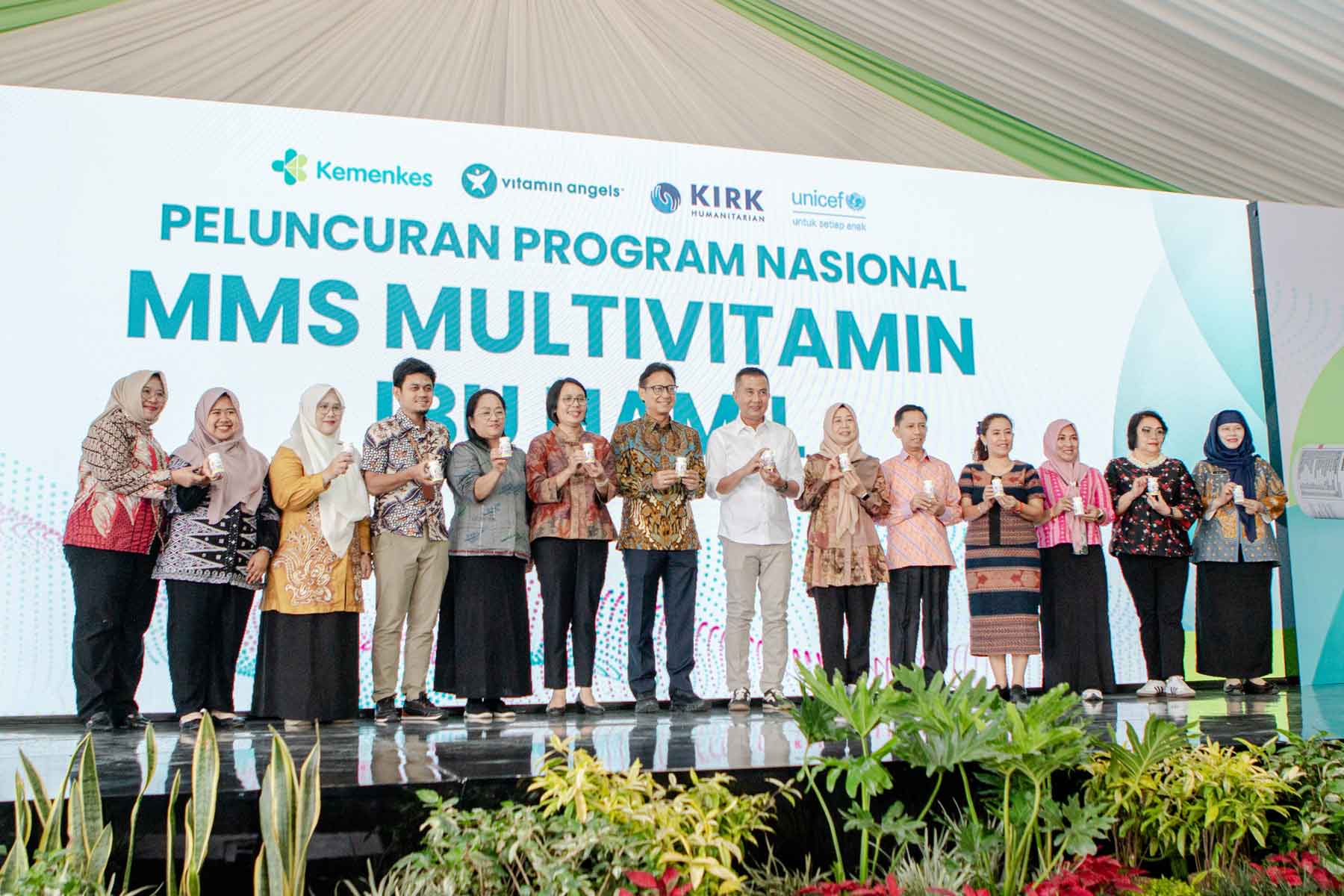
In 1975, Indonesia’s Ministry of Health introduced iron and folic acid (IFA) supplementation as a leading intervention to prevent malnutrition during pregnancy. However, nearly five decades later, the country continues to face high rates of anemia during pregnancy.
Since the 1990s, research has identified multiple micronutrient supplements (MMS) as a proven and effective prenatal supplement. Studies, including several conducted in Indonesia, show that MMS can lead to greater health outcomes for mothers and babies compared to IFA alone.
Indonesia recently made history by officially launching MMS as its national policy to support healthy pregnancies. Keep reading to learn how Vitamin Angels partnered with the Ministry of Health to support this groundbreaking transition – and what it means for Indonesia and the global MMS movement.
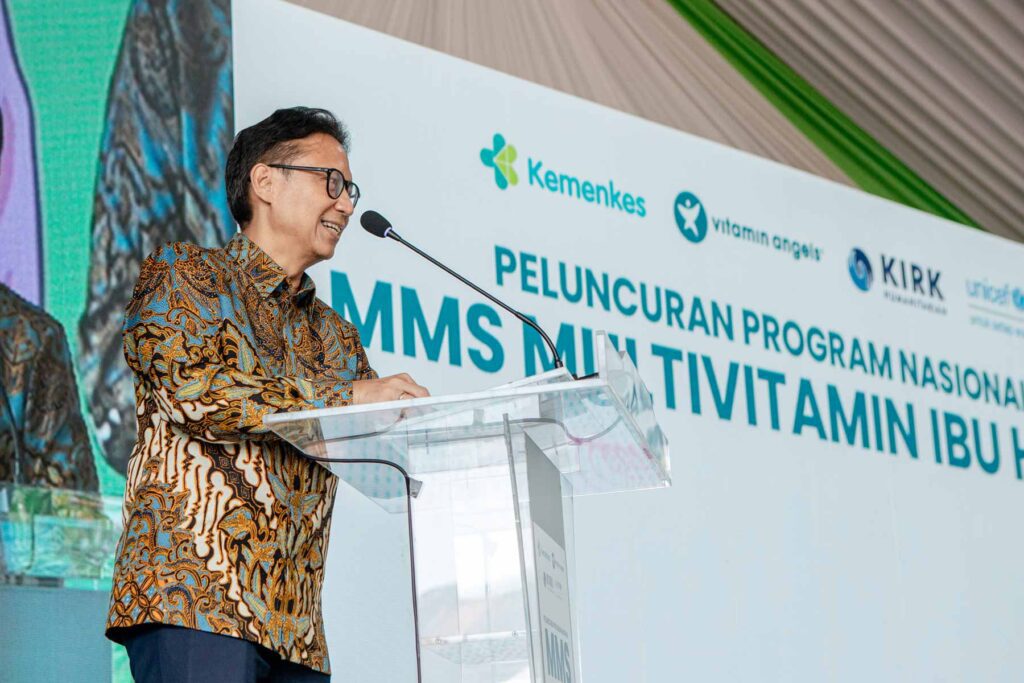
Highlights from Indonesia’s MMS Launch Event
By Quinn Harvey, Associate Director of Implementation Science, Vitamin Angels
On October 17th, 2024, the Ministry of Health in the Republic of Indonesia held an official commencement event to mark the transition of its national maternal healthcare program from providing pregnant women with iron and folic acid (IFA) supplements, containing just two nutrients, to multiple micronutrient supplements (MMS) that include 15 essential vitamins and minerals. This event marked the official launch of MMS programming in 15 provinces, with nationwide distribution across all 38 provinces planned by 2026.
Vitamin Angels’ team in Indonesia was honored to participate in this historic event, which brought together leaders including Minister of Health Budi Gunadi Sadikin, Director General of Public Health Dr. Maria Endang Sumiwi, midwives, and pregnant women, along with colleagues and partners whose tireless efforts made this achievement possible.
“The decision to transition to MMS is a groundbreaking step to improve maternal health and nutrition. On behalf of the entire Vitamin Angels team, we are very proud to support the Government of Indonesia in becoming one of the first countries to scale up this critical intervention.”
– Otte Santika, Vitamin Angels Senior Country Program Advisor, Indonesia
Over the last decade working with Vitamin Angels, I’ve witnessed the years of intense, collaborative effort that led to this achievement. The commencement event not only celebrated this policy shift, but also reflected Indonesia’s rich culture of storytelling and song.
Here are the key moments that defined this milestone event:
- Collaboration at Its Best. This success was built on a broad collaboration among the Ministry of Health in the Republic of Indonesia, Vitamin Angels, Kirk Humanitarian, and international programmatic collaborators including the Initiative to Advance Implementation Science in Nutrition within the Johns Hopkins Bloomberg School of Public Health, Nutrition International, the World Bank, and UNICEF. Additionally, the government partnered with several national partners including the University of Indonesia, Hasanuddin University, Airlangga University, Padjadjaran University, and the Indonesia Nutrition Institute (IGI).
Even during the challenges of a global pandemic, partners remained steadfast in their commitment to improving maternal and child health. Many key meetings and decisions happened virtually, making the in-person launch event even more meaningful.
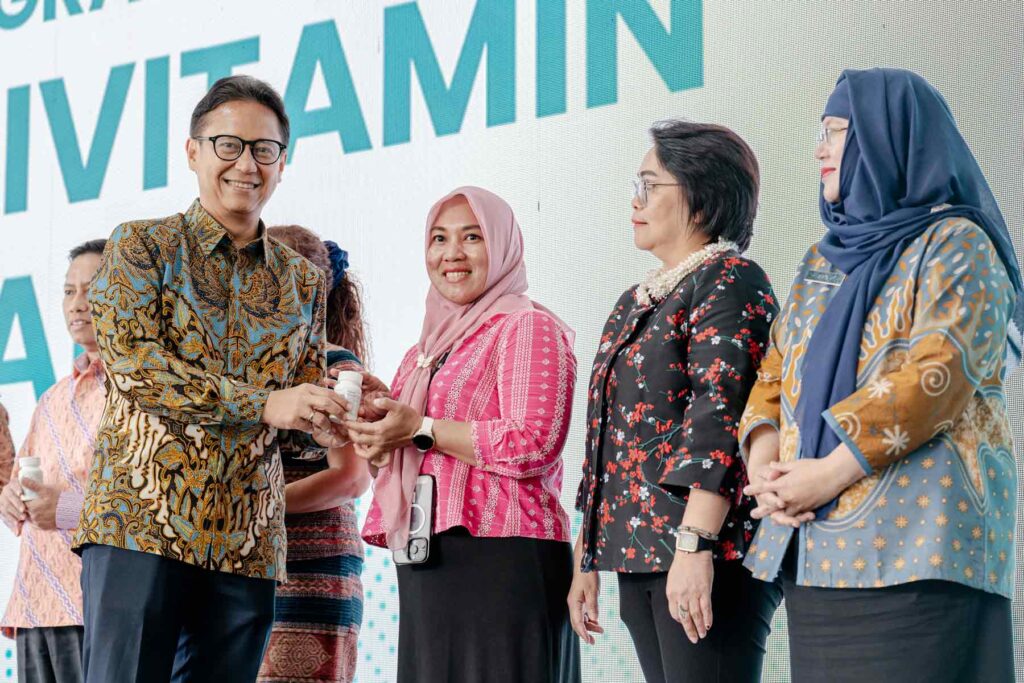
- Strong Government Leadership. Minister of Health Budi Gunadi Sadikin and Director General of Public Health Dr. Maria Endang Sumiwi delivered powerful remarks about the importance of MMS for maternal health in Indonesia. A symbolic moment came with the handoff of MMS bottles to representatives from the 11 districts selected for the program’s initial rollout. Watch the Minister of Health’s video clip of the event.
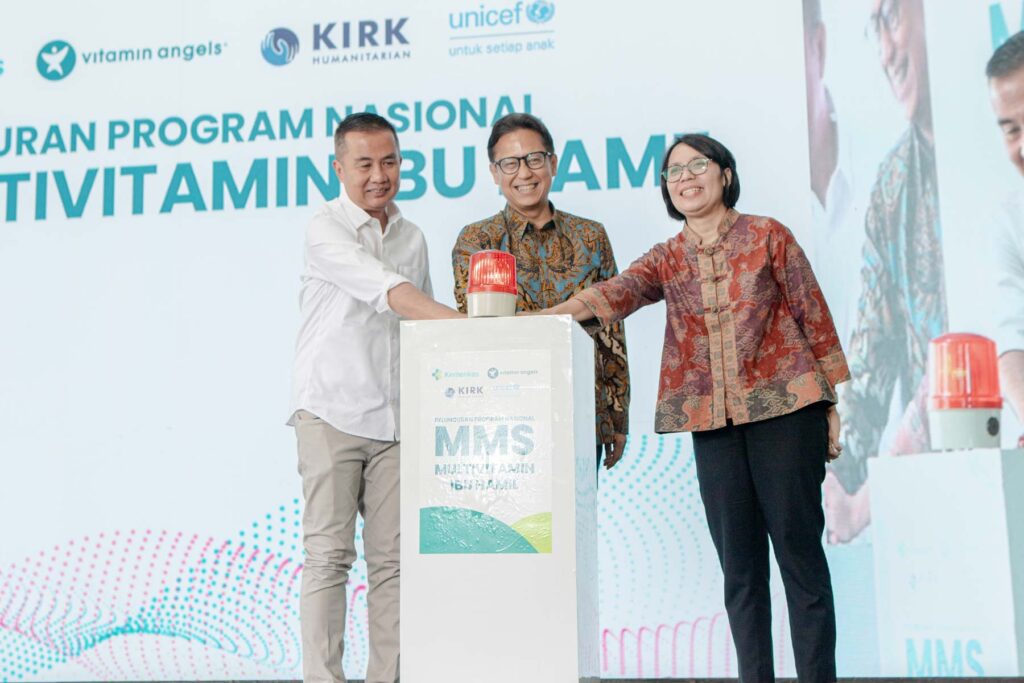
Another memorable highlight came when Minister Sadikin pressed a ceremonial button to officially launch the MMS program – a moment that was met with cheers from the audience.
After the event, Minister Sadikin visited Puskesmas Cempaka Arum, the local medical center, to learn about their antenatal care services and prenatal classes firsthand. Read one example of media coverage about the announcement.
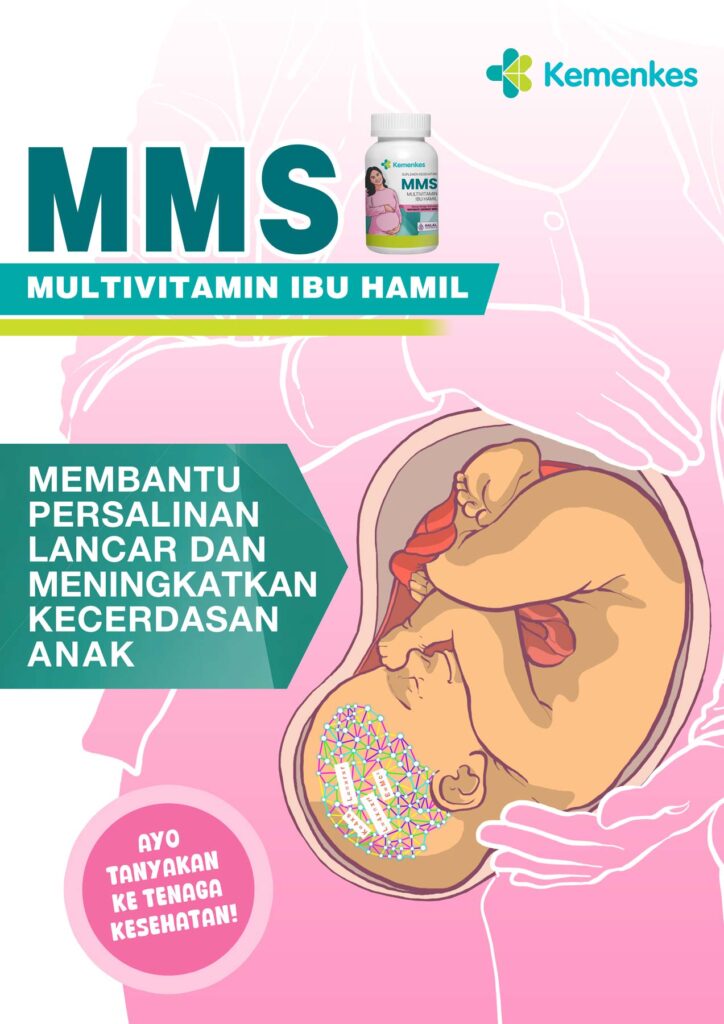
- Women at the Center. Indonesia has a rich tradition of storytelling and song-based messaging, which played a vital role in shaping health communication strategies. Vitamin Angels’ team in Indonesia, along with our partners, leveraged these traditions to develop effective communication strategies that highlight the importance of adequate nutrition during pregnancy and the postpartum period.
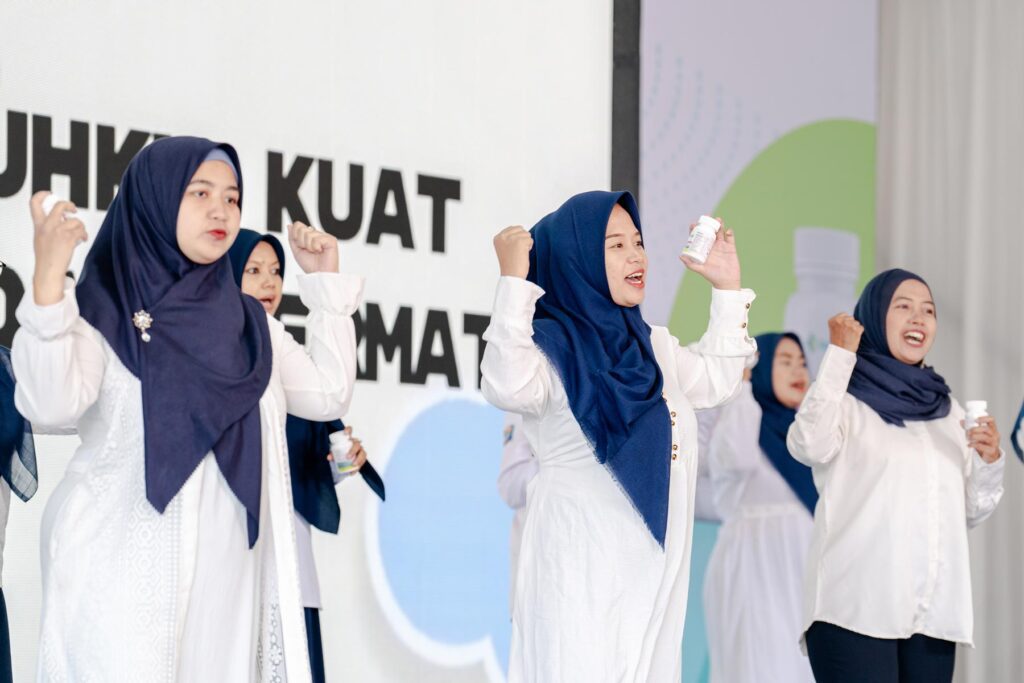
At the launch event, pregnant women, midwives, and Kader (a health volunteer at Posyandu, the Integrated Service Post for Health) performed an MMS song, with lyrics to encourage women to take their MMS tablets daily to improve the chances that their babies are born healthy and strong.
This celebration of women’s voices and creativity exemplifies how we work with pregnant women, their families, midwives, community health workers, and district health officials to tailor our implementation strategies to local contexts through an evidence-based, collaborative approach.
How it Happened
Indonesia’s MMS program is a testament to the expansion of research and pilot projects to fuel large-scale implementation, guided by an implementation science approach that can support effective scaling and sustainability. This marks a significant step toward the country-wide rollout of a proven and impactful intervention, but it’s just the beginning of a long journey.
Here are the key pillars that supported the transition to MMS:
- Lay the groundwork by understanding local contexts. For more than five years, Vitamin Angels collaborated with researchers at local and international organizations, including Universitas Indonesia, Universitas Airlangga, Universitas Hasanuddin, Johns Hopkins Bloomberg School of Public Health, and Johns Hopkins Center for Communications Programs, to understand the most effective MMS implementation strategies across Indonesia’s diverse contexts. This effort focused on first identifying the barriers and enablers to adherence and then developing key social and behavior change strategies. These included health provider communication, storytelling, and song-based messaging, which are being tested and refined to improve the program’s effectiveness.
- Kickstart the transition with donated product while identifying long-term sourcing for national scale. Through Vitamin Angels, Kirk Humanitarian donated 1.3 million bottles of UNIMMAP MMS annually for three years. Additionally, UNICEF also has committed to provide MMS to the MOH for two years. In parallel, the Indonesian government allocated funding in the national budget to purchase locally produced MMS starting in 2025 (depending the availability of local MMS supply), with plans to scale up to 4.8 million bottles in 2026. The government and the Pharmaceutical Industry Association of Indonesia have committed to local production of UNIMMAP MMS and taken proactive measures to support scale up.
Recently, Vitamin Angels, Kirk Humanitarian, University of Padjajaran, and the Ministry of Health organized a training session on global UNIMMAP MMS standards and specifications for the pharmaceutical industry in Indonesia. The training covered the global status of UNIMMAP MMS manufacturing, the role of Indonesian manufacturers, and how they can meet the technical specifications for UNIMMAP MMS as outlined in the Expert Consensus on an open-access UNIMMAP MMS Product Specification: 2024 Revision. This event was supported by the Indonesian Food and Drug Authority (BPOM), the Ministry of Finance, the Indonesian MMS Technical Advisory Group, and other partners and was attended by representatives from 24 organizations. - Engage in policy dialogue to ensure sustainable scale-up. Vitamin Angels and key leaders within the Ministry of Health have been actively supporting policy development, delivery strategies, and supply chain efforts for the introduction and scale-up of MMS. In collaboration with the Ministry of Health and universities (University of Indonesia, University of Hasanuddin, University of Airlangga, and University of Padjadjaran), we contributed to the creation of a national MMS Standard Specification, language for a national MMS policy, an IFA-to-MMS transition plan, and Technical Guidelines for Implementing MMS.
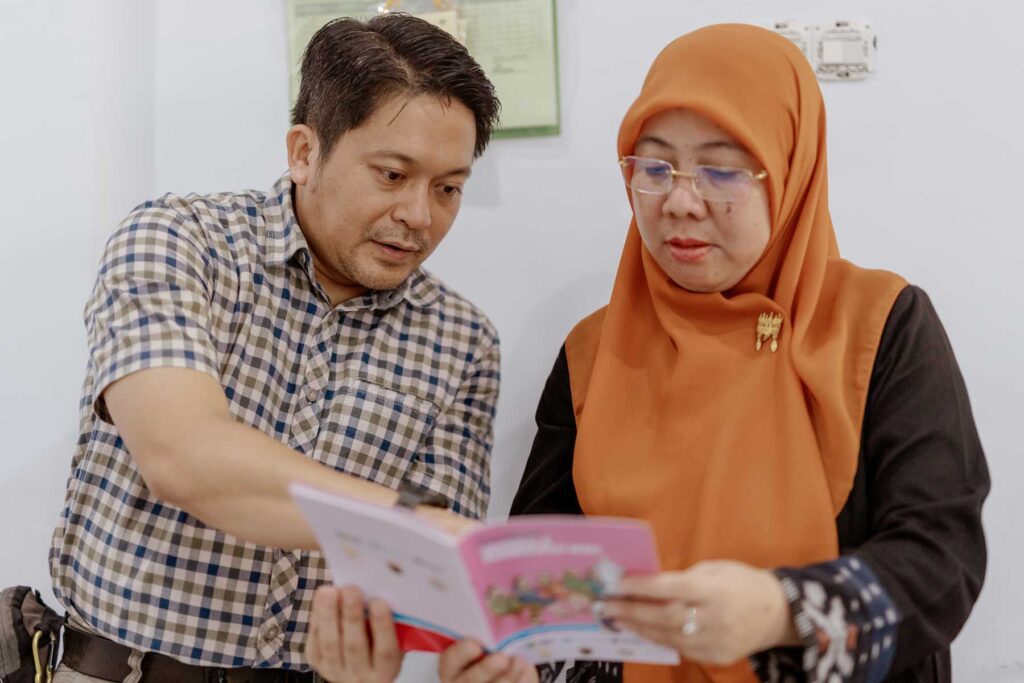
A Considerable Milestone for Indonesia and the World
Introducing and scaling a proven health intervention like MMS requires a systematic and flexible approach, where every step – big or small – builds towards a sustainable foundation. Indonesia’s decision to integrate MMS into national policy creates the environment needed to align diverse efforts and drive meaningful progress in improving maternal nutrition.
With an estimated five million pregnancies in Indonesia each year, the potential health impact of this policy action is huge. Beyond Indonesia, this milestone sets a powerful example for other countries looking to advance maternal and child health through MMS. Vitamin Angels is proud to support this historic effort and excited to continue working with the Indonesian Ministry of Health to help ensure MMS programming reaches its full potential.
To learn more about Vitamin Angels’ work in Indonesia, explore our case study.
